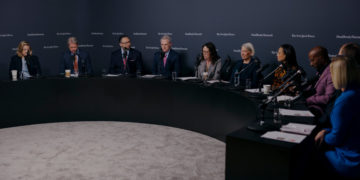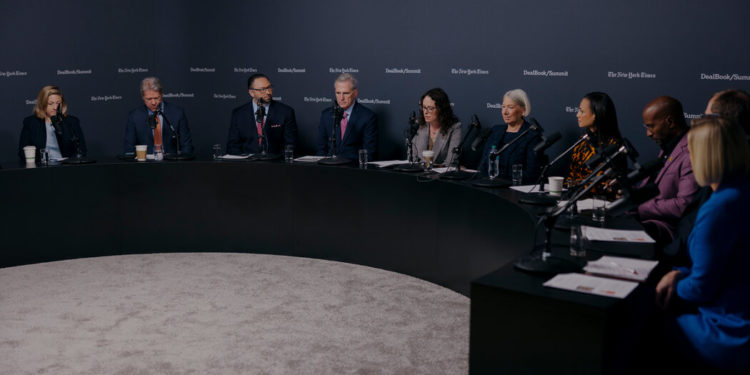In the month since President-elect Donald Trump won the U.S. presidential election, there has been much debate over what led to his clear but narrow victory. At a task force session at the DealBook Summit, The Times’s senior political correspondent Maggie Haberman moderated a thoughtful, nuanced and sometimes contentious debate among political figures, advisers and journalists about what happened. Heres what they said.
Van Jones: “You’re pushing people out of the party.”
Jones is an author and host for CNN.
“Our party is supposed to be the party of F.D.R. and working folks,” Jones said of the Democratic Party. “But if you don’t eat kale and go to yoga classes, you can’t go to most of these meetings.” He said that Democrats were too skeptical of cryptocurrency and Silicon Valley, and that they missed an opportunity by not inviting Elon Musk, the chief executive of Tesla, to an electric vehicle event at the White House because his company didn’t employ union workers. “You’re pushing people out of the party,” he said.
Democrats also failed to speak to men, Jones said:
“Men are hurting. And the feminist culture tells you, Don’t cry because you’re the problem anyway. And the masculine culture tells you, Don’t cry because boys don’t cry. So you just aren’t able to talk about how scared you are that you can’t provide for anybody. You can’t talk about how scared you are that you don’t understand your kids and what’s going to happen to them. You can’t talk about anything. So at least Donald Trump lets you have an emotion besides shame.”
Sarah Longwell: “There’s actually a political realignment going on.”
Longwell is the publisher of The Bulwark and the host of the podcast “The Focus Group.”
“Most of the independent voters, they were double haters,” Longwell said, meaning they liked neither candidate. She also addressed Jones’s idea that Democrats had excluded groups from the party:
“It’s not just that people are being pushed out of the Democratic Party. There’s actually a political realignment going on. And so the Democratic Party is now populated by a lot more of these college-educated voters, and there aren’t enough of them.”
She also said that Trump’s celebrity status gave him a “superpower that other people don’t have,” and that when he displays qualities that would hurt other politicians at the polls, “because he’s on TV, because he was on Page Six, it’s like a celebrity thing that they forgive.”
Kellyanne Conway: “This election was a rejection of wokeness.”
Conway was a campaign manager for Trump in 2016.
The Democratic Party has leaned too heavily into identity politics, Conway said:
“Every day they wake up, it’s still Jan. 6, 2021, on the calendar. They get in an electric vehicle, they get an abortion. You’re out of touch with the public. This election was a rejection of wokeness.”
She also criticized President Biden’s industrial policies. He lost voters, she said, by “thinking that he was F.D.R.” instead of “realizing you’re here to be the post-Covid caretaker.”
Jonathan Karl: “Nobody stepped forward to take him on.”
Karl is the chief Washington correspondent at ABC News.
Several panelists argued that Biden’s decision to run for a second term cost Democrats the election. “He should have been a one-term president who was a bridge and let the party have a primary,” Longwell said.
Karl questioned why the Democratic Party didn’t challenge Biden’s nomination:
“Ultimately, it’s on those future leaders of the Democratic Party — and the bench was deeper than it had been for a long time — not to ultimately step in and say, I’m going to take him on. Nobody stepped forward to take him on.”
He said the question that Democrats had to ask themselves was “not whether or not Biden should have dropped out first,” but why “none of these major figures, the governors, came forward and said, ‘I’m going to take on Joe Biden.’”
Anita Dunn: “We have absolutely lost our credibility with people who are at the lower end of the economic scale.”
Dunn is a former senior adviser to Biden.
Dunn said: “If you were to say to me, Why did you lose? The easiest answer out there is inflation and prices, and the cost of rent.” She added:
”Joe Biden was elected president in 2020, losing the economy to Donald Trump. They still thought Trump was better on the economy, even as Joe Biden was elected. But it was a huge issue, and inflation is something that I think you can’t message your way out of.”
Referring to working class voters, she said that the biggest problem the Democratic Party was facing now was that “the people we think we’re representing don’t think we are representing them when it comes to a core issue for them, which is the economy and ‘how am I going to make it?’”
Kevin McCarthy: “What was the campaign about?”
McCarthy was the speaker of the U.S. House of Representatives from January 2023 to October 2023.
Vice President Kamala Harris’s campaign for president was not executed well, McCarthy argued:
“I could not tell you the three things she was going to accomplish if she got elected. The only thing that comes to mind is she was going to give first-time home buyers $25,000. So that’s a repudiation on the campaign itself: What was the campaign about?”
Alexis McGill Johnson: “I think we are overstating the multiracial coalition that Trump brought in.”
McGill Johnson is the president of Planned Parenthood.
McGill Johnson said that she would have liked to see Democrats talk more about “the economic constraints that families were experiencing,” and she pushed back on the idea that Trump had created sustained momentum among voters of color:
I see this as a rollback on 50 to 100 years of progress that we have been making among communities of color, among gender, among, you know, people who just want to live their lives. And I think we are overstating the multiracial coalition that Trump brought in. I really do, because I think there are enough people who stayed home who weren’t inspired to come out because the Democrats didn’t offer something.
Jason Miller: “Trump cut through.”
Miller is a senior adviser to Trump.
Trump made more appearances and appeared more authentic during the 2024 campaign, Miller argued:
“As a candidate, people wanted to have a beer with and talk about their economic future with somebody who doesn’t drink and somebody who himself is a billionaire, because he was authentic, because he could speak to them, direct and plain-spoken, and without a filter. And when you look at the way that Biden and Harris tried to hide, then President Trump cut through.”
Major Garrett: “The country confers the normality of the presidency.”
Garrett is the chief Washington correspondent at CBS News.
Thinking about Trump as an abnormal president is the wrong approach, Garrett said:
The presidency is an institution. The country confers the normality of the presidency, full stop. The occupant of the presidency is the president, and you cover the president and you do it with curiosity and clarity and accuracy, and that’s it. And if you get emotionally involved in it, not only is that journalistically erroneous, Trump will manipulate you.Trump understands your emotions much better than you do. Figure that out, people. Trump is someone who possesses, within the political context, supreme emotional intelligence, especially where reporters are involved.
Margaret Hoover: “Digital is the new media.”
Hoover is the host of “Firing Line With Margaret Hoover” on PBS.
Several panelists argued that shifts in how voters find information meant that politicians needed new strategies to reach them. Jones said that digital “is the new door knocking” and that on digital platforms, “there are people out there that are getting 14 million streams, and we’re on cable news getting one or two million.” Hoover pointed to another aspect of digital platforms: “Being able to see transparently on camera what is happening is part of the story.” She added:
“I do think digital isn’t not just the new door knocking; digital is the new media. I mean, digital is how we hold those in power to account.”
Thanks for reading! We’ll see you tomorrow.
We’d like your feedback. Please email thoughts and suggestions to [email protected].
The post The New Politics appeared first on New York Times.



















